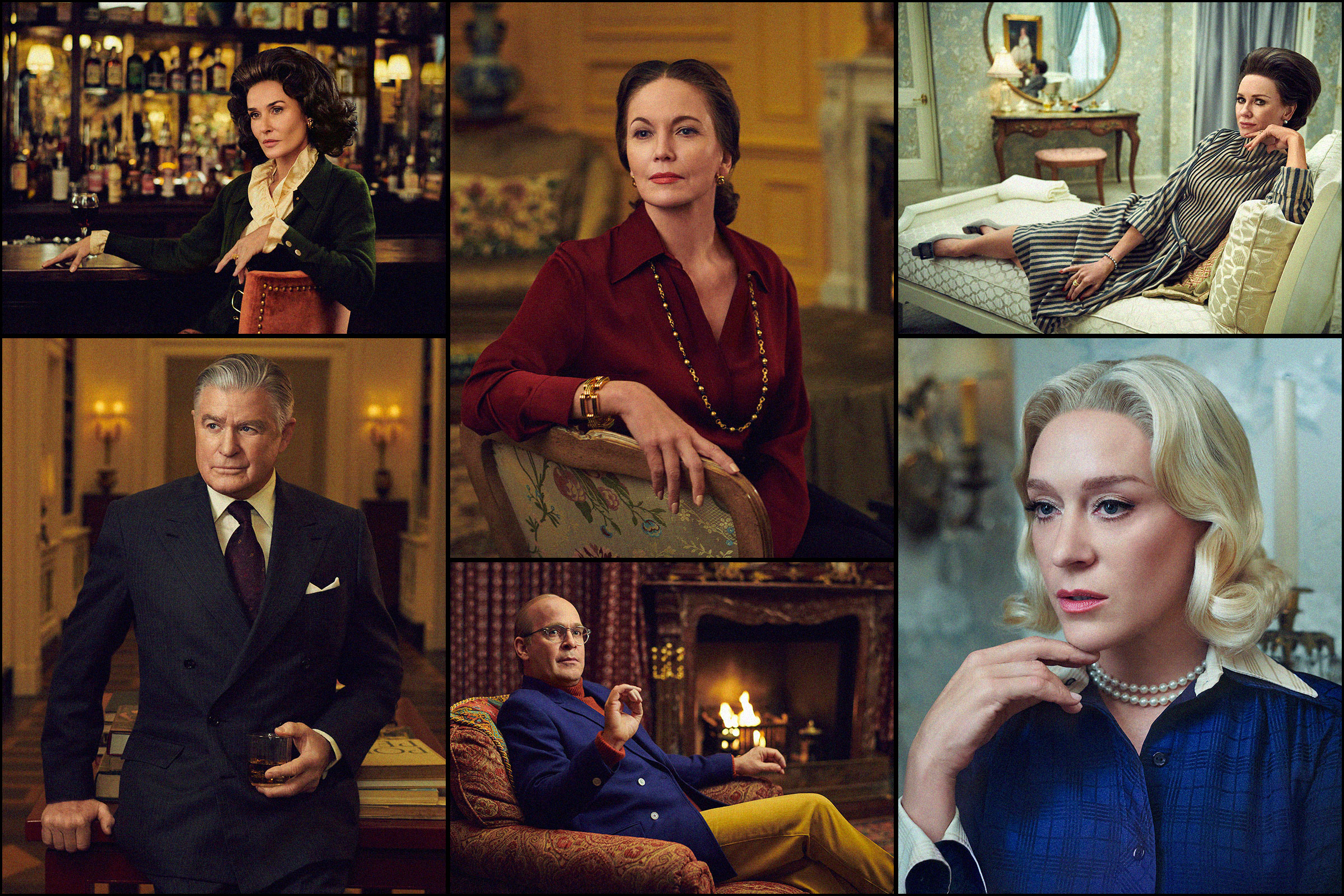
Torrid affairs, social snubs, and even murder make up the bombastic scandal that upends New York society with the publication of a Truman Capote piece in Feud: Capote vs. the Swans. The show, the second installment of the Ryan Murphy FX limited series which released this week, is a juicy retelling of the real-life drama that erupted after Capote, a close friend and confidant to New York's most glamorous socialites in the 1960s and 1970s, wrote a thinly veiled account of their deepest and darkest secrets for a dishy 1975 Esquire article titled, "La Côte Basque 1965."
Directed by Gus Van Sant, the series is based primarily on Laurence Leamer's 2021 book, Capote’s Women: A True Story of Love, Betrayal, and a Swan Song for an Era, and focuses on the Capote and his glamorous "swans." The coterie includes high society doyennes like Babe Paley, Slim Keith, Lee Radziwell, and C.Z. Guest, and the series follows them before, during, and after the fallout. It's a show that's fueled by the scintillating gossip and private details of some of the most high profile figures of their time—as the show's tagline correctly quips, these women were "the original housewives" and their real life drama makes for rich fodder in Feud's reimagining.
Read more: Substance Edges Out Snark in Ryan Murphy’s Messy, Fascinating Feud: Capote vs. the Swans
With that in mind, here's a guide to all the scandals and socialites that inspired the characters and scenarios in Feud.
Truman Capote
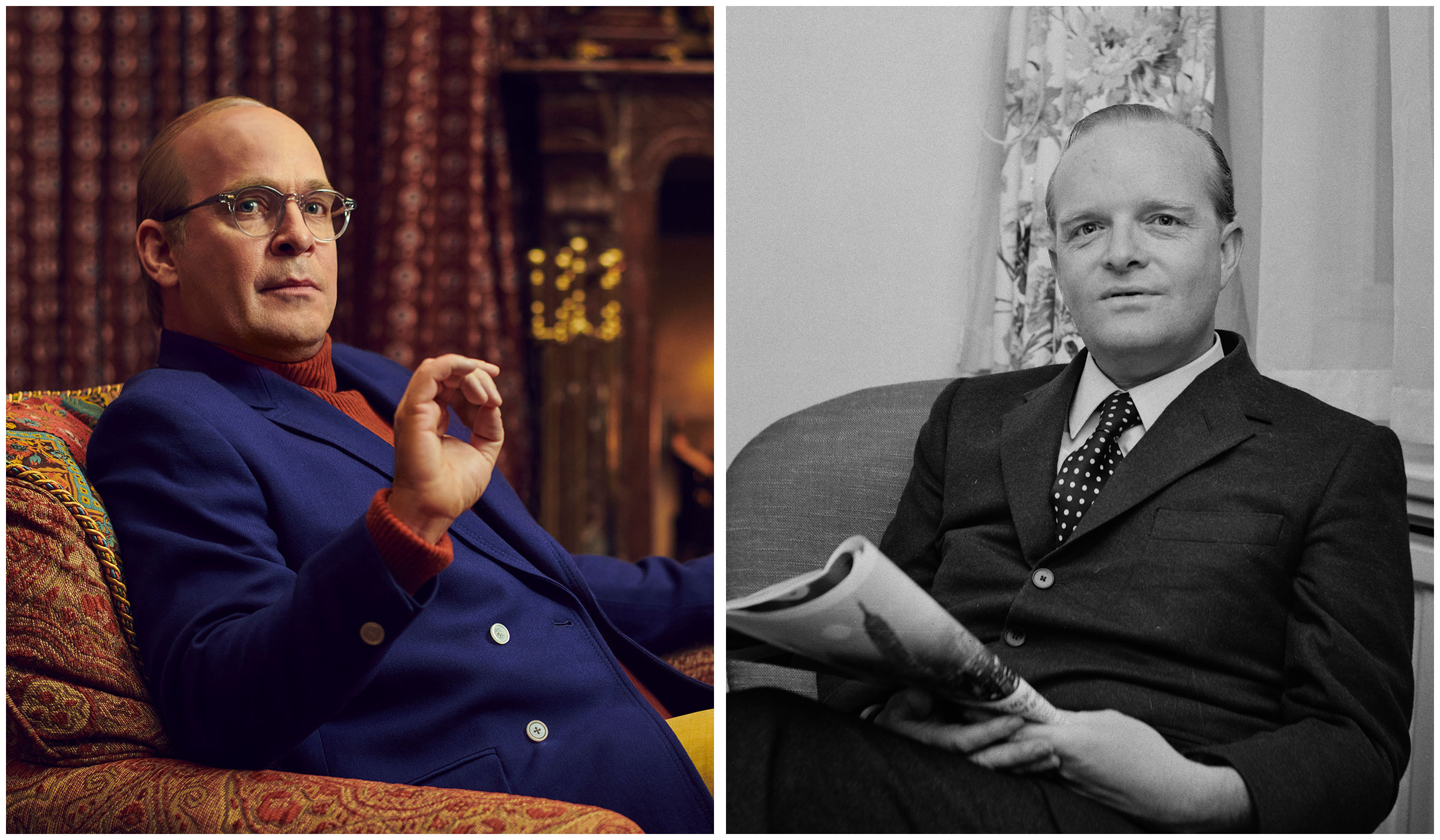
In Feud, Truman Capote (Tom Hollander) has insider's access to one of the world's most exclusive circles—New York high society. The writer, who became a veritable celebrity himself with the outstanding success and critical acclaim of works like Breakfast at Tiffany's and the true crime nonfiction novel, In Cold Blood, grew close to many of leading socialites of the time and became privy to their secrets, scandals and vulnerabilities of the social scene's most high profile women. The role of confidant and witty bon vivant to New York's most glittering society jewels was a position Capote held dear. He relished his access to influence through the glamorous socialites he affectionately called his "swans" and their powerful and wealthy husbands.
In the show, Capote betrays his devotion to the swans in service of his craft. Struggling with writer's block and various demons, including an abusive new relationship and reliance on drugs and alcohol, Capote mined his social life for inspiration—publishing a thinly veiled tell-all of high society's secrets with "La Côte Basque 1965," an excerpt of his upcoming (and never to be finished) new novel, Answered Prayers, that was released in Esquire in 1975—and wrecking social havoc in the process. In real life, the article did send shockwaves through New York society, with many of its key figures (who also happened to be Capote's closest friends) recognizing themselves and their darkest secret splashed across the page, leading to a swift backlash—and his exile from the elite circles of high society.
While Capote's self-destructive tendencies accelerated following the notoriety of "La Côte Basque 1965," the show seeks answers beyond his outcast status, diving into his fraught relationship with his mother, Lillie Mae Faulk. For Capote, who was born in New Orleans, and spent his childhood raised in Alabama by his mother's relatives after his parents divorce (where he befriended a young Harper Lee), his mother's fleeting presence in his life and obsession with being accepted in high society—and her inability to secure it—left a lasting impact. As Feud implies, this may have influenced his gravitation to the swans, as well as his willingness to betray them.
For Capote, finishing Answered Prayers would be a lost cause, riddled with missed deadlines and many advances. While he had been talking about the novel since 1958 and published various excerpts in it over the nearly two decades he worked on it, he was unable to finish it before his death in 1984. The unfinished version of it was published three years after his death.
Babe Paley
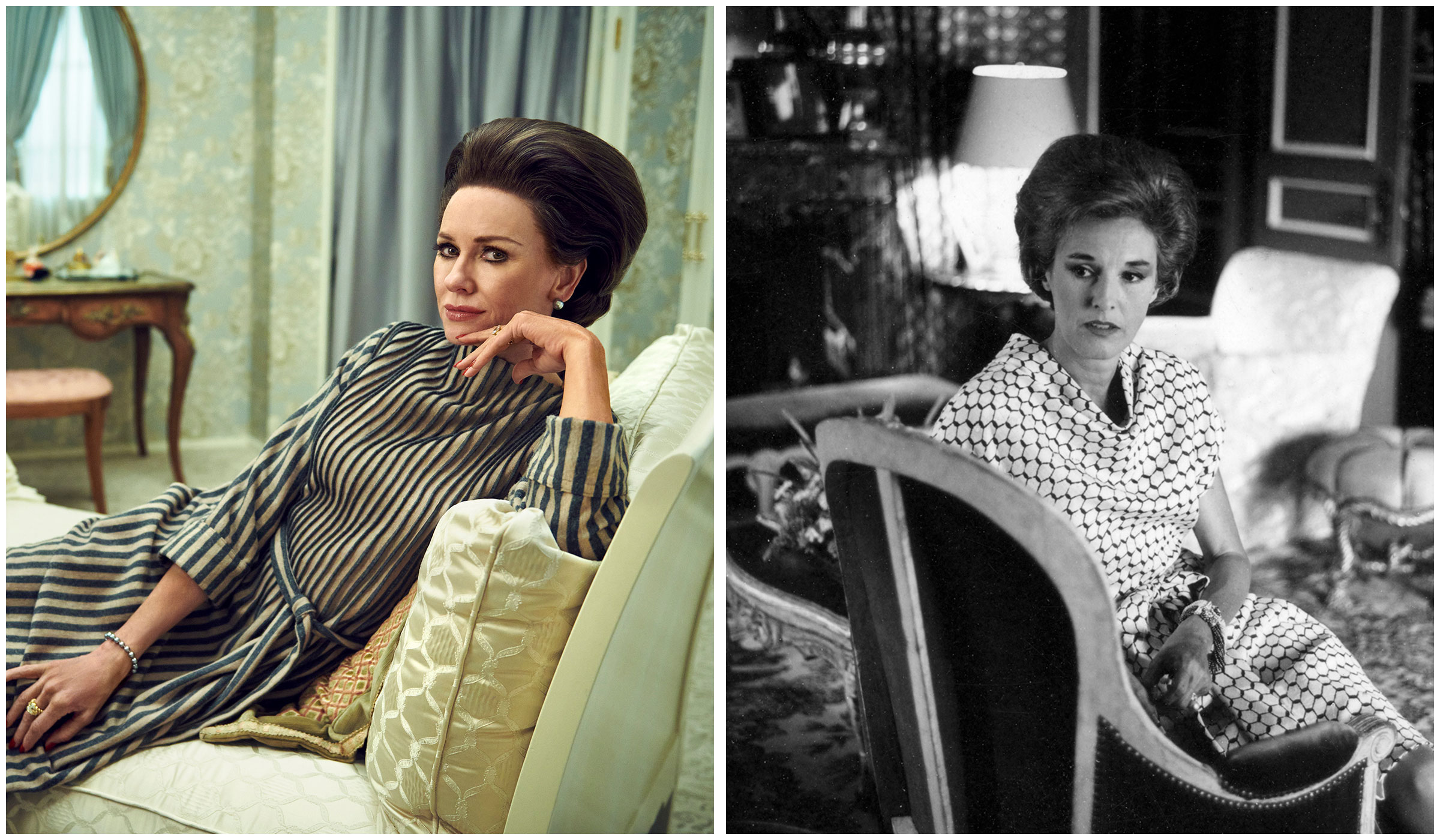
Though all of Capote's swans in Feud are glamorous and powerful society fixtures, Babe Paley (played by Naomi Watts, who also serves as one of the series' executive producers) emerges as the undisputed yet graceful leader of the pack. In real life, Paley reigned supreme over New York's social scene from the 50s until her untimely death from lung cancer in 1974. Born Barbara Cushing, she was the daughter of prominent neurosurgeon Harvey Cushing and grew up in the tony neighborhood of Brookline, MA., where she and her two older sisters were nicknamed "The Fabulous Cushing Sisters" because of their status as in-demand debutantes, and later, their marriages into prominent American families (Paley's first marriage in 1940 was to sportsman and advertising executive Stanley Grafton Mortimer Jr., a descendant of John Jay, one of America's first chief justices and a signatory of the Declaration of Independence. It ended in divorce in 1946.)
After moving to New York City, Paley began working as a Vogue fashion editor in 1938, a position she held until her second marriage to Bill Paley in 1947. Paley's impeccable and trend-setting style helped to define her legacy as a society figure: she was named to the international best dressed list 14 times before she was inducted into the Fashion Hall of Fame in 1958. Likewise, her pursuit of perfection and prodigious attention to detail, from her home decor to her party planning made her a society legend; according to Vanity Fair, Paley had even meticulously planned her own funeral, down to the flowers and wine, handpicking pieces of her jewelry collection to be given to friends and family after her death. Her tightly controlled and at times, aloof public persona was a part of her allure—though her husband's philandering ways were an open secret and she juggled many social responsibilities, the socialite was intensely private, relying on select close friendships and tranquilizers to maintain her cool.
In the series, Paley's friendship with Capote was born in 1955, after he accompanied movie producer David O. Selznick and his wife Jennifer on a trip to the Paleys' vacation home in Jamaica; while both Paleys initially believed that Selznicks' friend was former president Harry S. Truman, the actual Truman and Babe became fast and inseparable friends, with Capote placed as a stand-in for the emotional intimacy missing from Babe's marriage. In real life, while the origins of their friendship can't be confirmed, there's no denying that for two decades, Capote was privy to the secrets and innermost thoughts of the circumspect Paley.
For his part, Capote was infatuated with Paley, especially with her great beauty and influence. In a journal entry, he once wrote of her: "Mrs. P. had only one fault: she was perfect; otherwise, she was perfect." Their friendship came to an abrupt end in 1975 after he published "La Côte Basque 1965," a seeming roman a clef portrait of the dishy secrets of New York high society that placed two characters "Sidney and Cleo Dillon" at the center of the drama. In the article, the biggest scandal of the social scene is a piece of gossip about a one-night stand that Sidney Dillon, a media mogul, has with the New York governor's wife, which results in a menstrual blood stain on his bed's white sheets—and his indiscretions being laid bare for Cleo Dillon to face. For such a private person as Babe, Capote's flippant, if thinly veiled, revelation of the dynamics of her marriage no doubt felt like a betrayal, especially as she had been diagnosed with lung cancer in 1974. It was reported that she cut off all communication with Capote following the publication of the article, with no reconciliation before her death from cancer in 1978.
Slim Keith
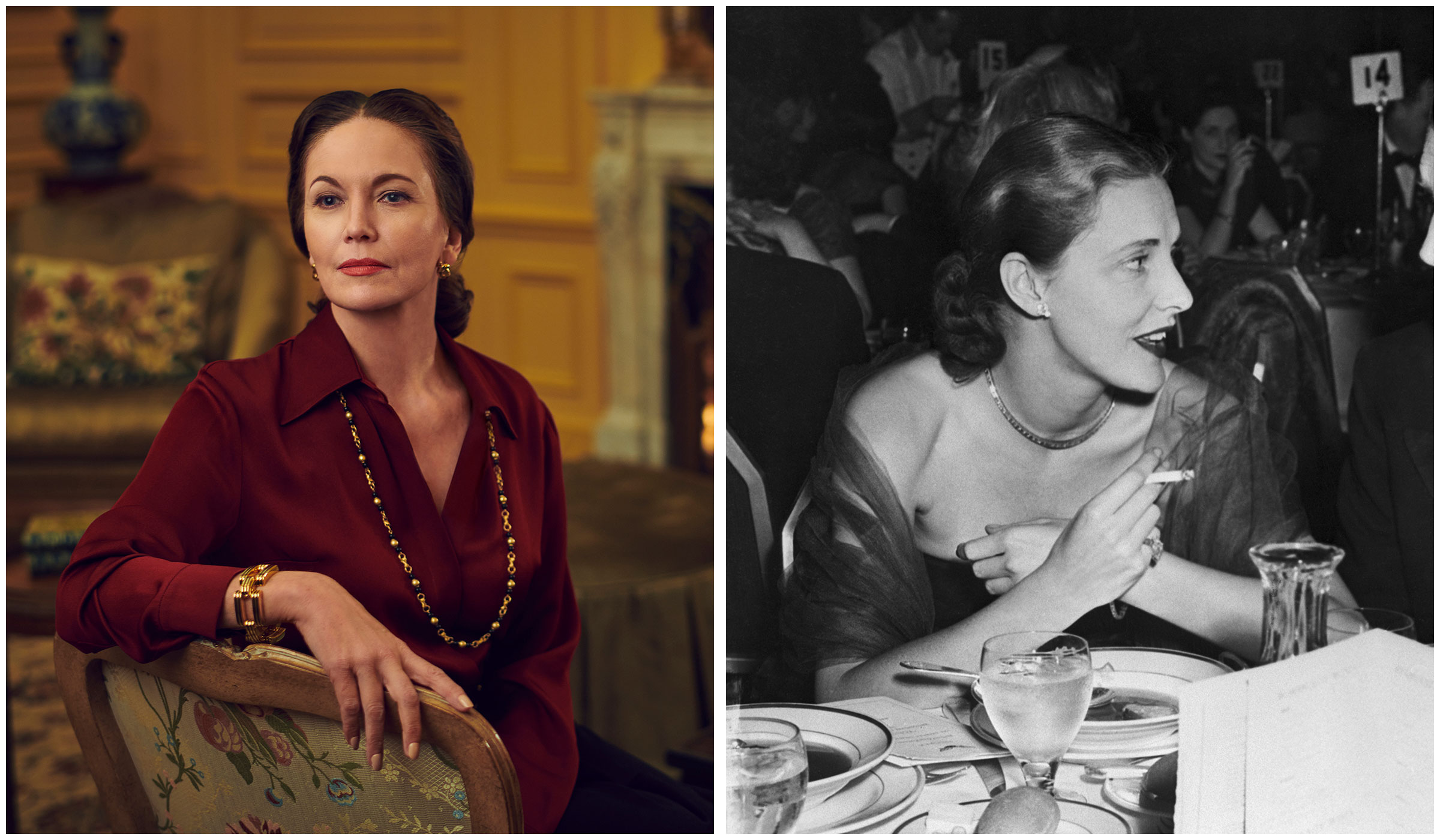
In Feud, Slim Keith (played by Diane Lane) is the most spirited of the swans—and the most stubbornly committed to holding a grudge against Capote after the publication of "La Côte Basque 1965." While there's no way of knowing whether or not Keith lead the charge to ostracize Capote in real life, like Paley, she was seemingly depicted prominently in the article, leading to her reportedly cutting off all communication with him. In the piece, the narrator receives all his gossip over lunch with the dishy "Lady Ina Coolbirth," a literary dead ringer for Keith, who divulges scandalous secrets about everyone from the British royal family to her close personal friends.
Keith, who was born Mary Raye Gross, was a California girl from John Steinbeck's hometown of Salinas. Though she modeled in her early years, which helped to give her her nickname "Slim," she became known for her sporty and casual style and her Hollywood paramours, including her first two marriages to director Howard Hawks and producer Leland Hayward and rumored dalliances with Clark Gable and Ernest Hemingway. Her third and final husband was British banker Lord Kenneth Keith, which afforded Slim her British title, Nancy Lady Keith. While the series posits that Keith and Bill Paley had an affair, there's no evidence that it happened in real life; one of the show's depictions that was true, however, was Keith's consultation with a lawyer about suing Capote for libel.
C.Z. Guest
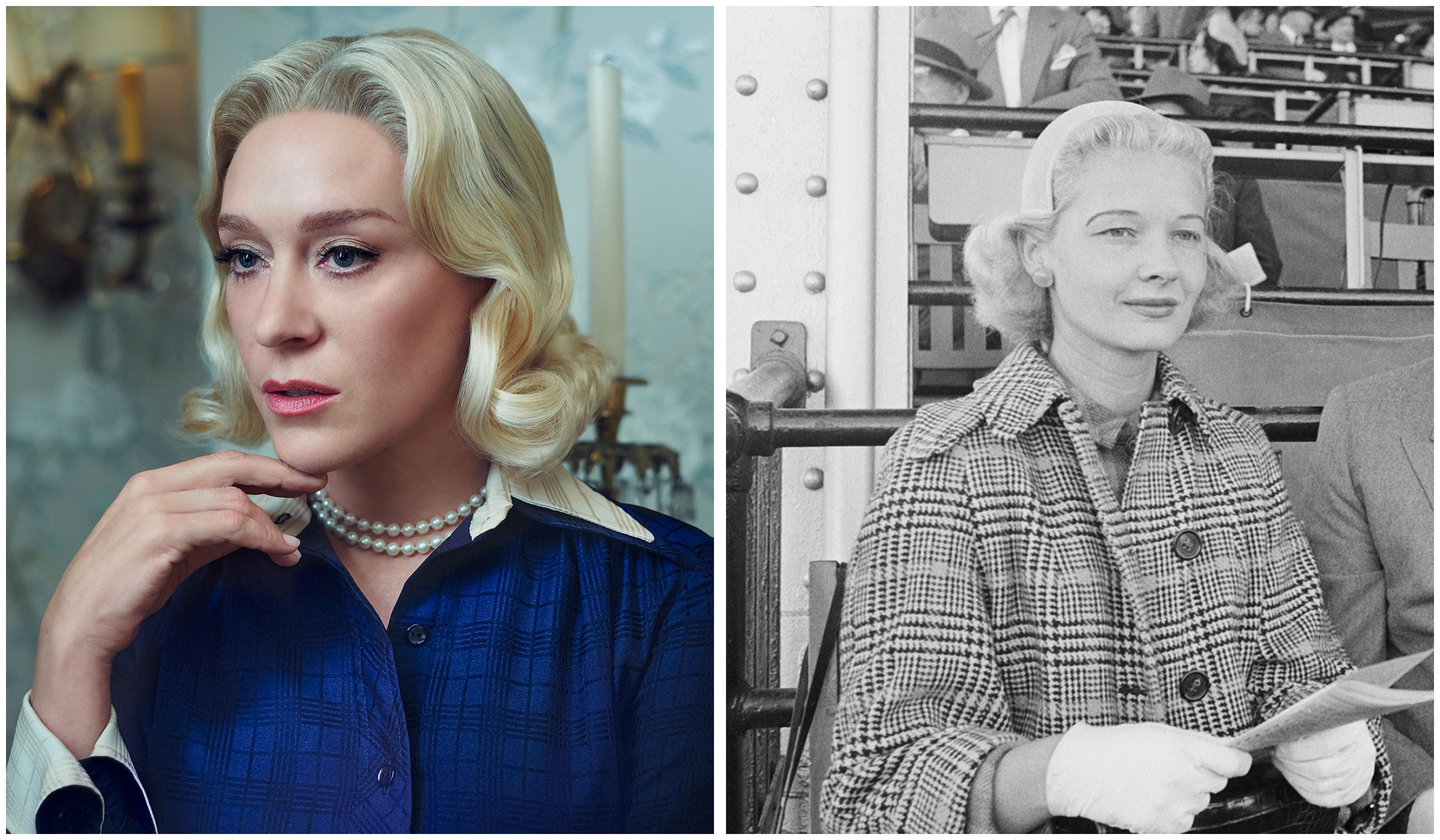
On the show, C.Z. Guest (played by Chloë Sevigny) is the only swan that continues to associate with Capote socially after the publication of "La Côte Basque 1965"—which, as Slim Keith shrewdly notes, is easy because she wasn't mentioned in the damning article. In real life, Guest's name was absent from "La Côte Basque 1965," and she continued to appear publicly with Capote in New York society even after the article published. Capote even wrote the introduction to her 1976 book, First Garden.
Born Lucy Cochrane into a Boston Brahmins family, Guest's distinctive name came from her brother's nickname for her, "Sissy," which she then styled for the rest of her life as C.Z. Just as in the show, the cool blonde was noted for being an accomplished equestrian, a renowned gardener, and a muse to some of the greatest artists of the time, being painted by the likes of Salvador Dalí, Andy Warhol, and Diego Rivera (the show's claim that she was painted in the nude by Rivera is true—the odalisque portrait hung over a Mexico City hotel bar, until she became engaged and her fiancé's family bought it.) Her husband Winston Frederick Churchill Guest, a polo player and second cousin of British Prime Minister Winston Churchill, was also well-connected in the arts; their 1947 wedding was held at Ernest Hemingway's Havana, Cuba estate, with Hemingway serving as the best man.
Guest, who was described by Capote as a "cool vanilla lady," helped to pioneer the preppy style now associated with American sportswear and WASP culture, nabbing her the best dressed title by the New York Dress Institute multiple times and later, being inducted in the International Best Dressed Hall of Fame in 1959. Her distinctive patrician look also made her a favorite of the photographer Slim Aarons and landed her the cover of TIME Magazine in 1962, for a cover story entitled "What It's Like Today in Society."
Lee Radziwell
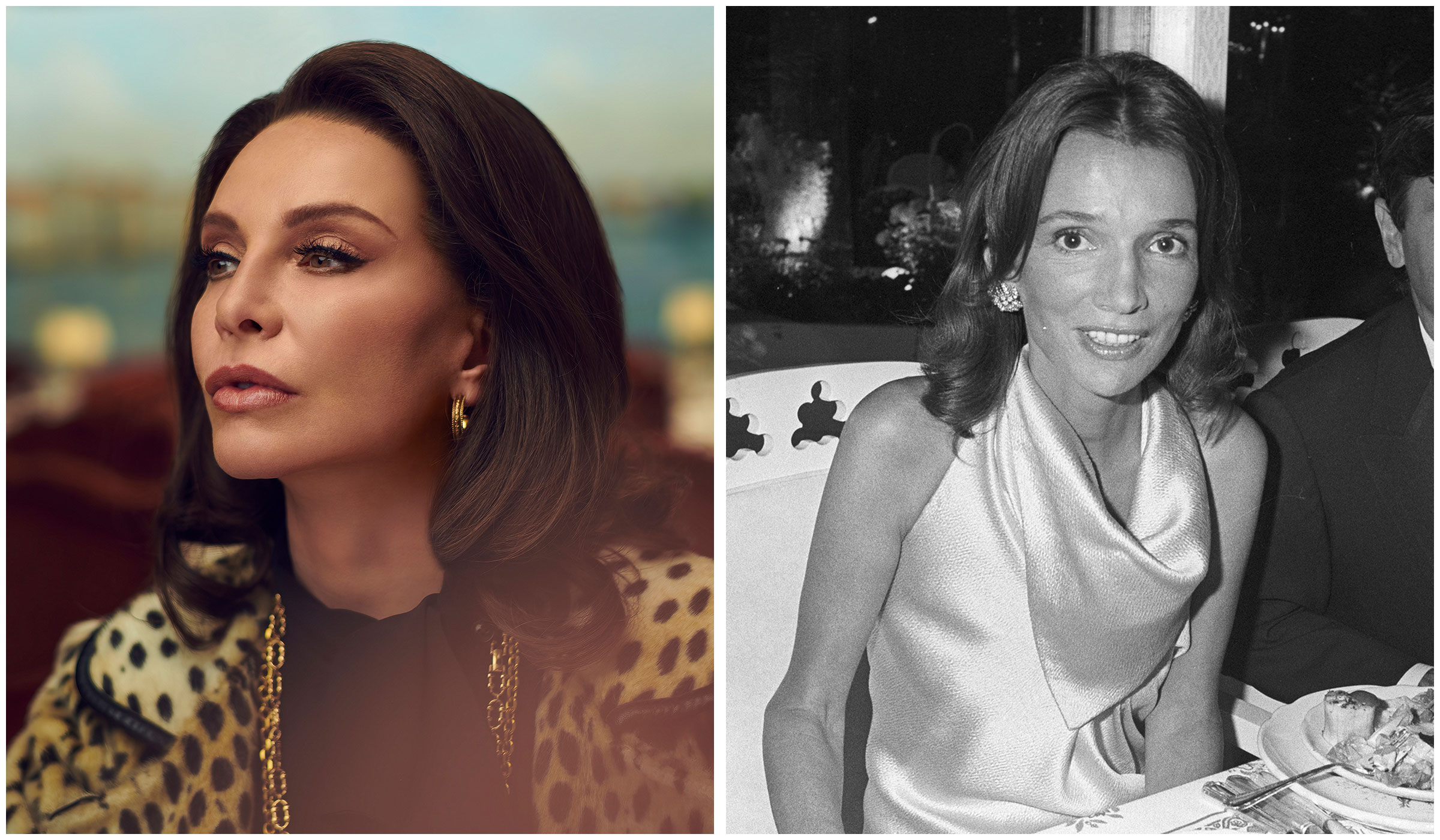
One of Capote's most glittering swans was Lee Radziwell (played in the show by Calista Flockhart), the international socialite and sister of Jacqueline Kennedy Onassis. In the show, Radziwell has contempt for Capote after the publication of "La Côte Basque 1965," but in real life, Radziwell did not cut him off after the article was released, despite being name checked with her real name in it (both she and her sister are referred to as "geisha girls.") The show does depict the real-life end of their friendship in 1977, however—when Radziwell refused to testify on behalf of Capote in a libel case brought against him by fellow writer Gore Vidal.
Capote had long found an ally in Radziwell, having become close to her as a confidant that she could share her deepest insecurities with—primarily, her jealousy at being constantly in the shadow of her older sister. While Radziwell had had ambitions of being an actress and also dabbled in interior design, she primarily known for being a well-heeled member of the jet set, her dalliances (her second marriage was to a Polish prince) and for being Jackie O's little sister. The latter distinction was one she would fight to be recognized outside of her whole life. In a glamorous kind of sibling rivalry, Radziwell seemingly competed with her sister over men, fame, and fortune for the entirety of their lives.
Ann Woodward
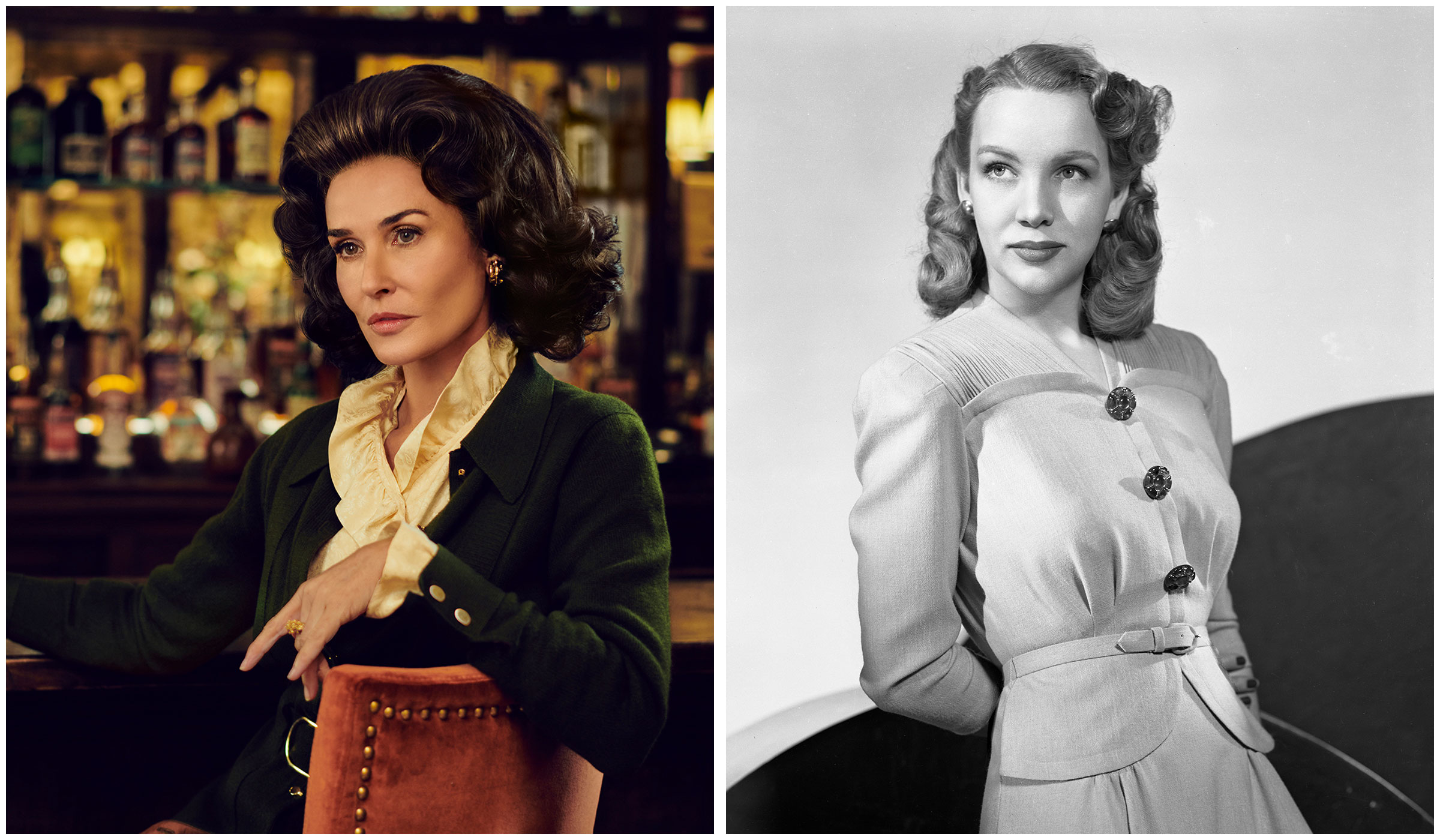
Of all of the salacious stories that Capote details in "La Côte Basque 1965," Ann Woodward (played in the series by Demi Moore) may have gotten the most harrowing treatment after Capote writes a scathing and thinly veiled reference to "Ann Hopkins," that accuses her of murdering her husband. In real life, Woodward was at the center of a scandal around her husband's 1955 murder: while she was never charged for his death, Woodward had killed him with a shotgun, which she alleged was done because she mistook him for a burglar.
The controversy surrounding Woodward was especially scrutinized because of her humble beginnings—she grew up working class in Kansas before becoming a radio actress and a showgirl, which led to meeting her future father-in-law at the club she worked and later, his son, who would become her husband. According to Roseanne Montillo in her book Deliberate Cruelty: Truman Capote, The Millionaire's Wife, and the Murder of the Century, Capote and Woodward were not close, but had a fateful and fraught meeting that would impact both of their lives. In Montillo's telling, in 1956, a year after her husband's murder, Woodward was approached by Capote while dining in St. Moritz, which resulted in her calling him a homophobic slur.
"He returned the slur by wagging his finger at her and calling her ‘Mrs. Bang Bang,’ a moniker that would stick to her for the rest of her days," Montillo writes, noting that Capote often gossiped about Woodward for years afterwards.
Capote's cruelty was scrutinized following the publication of his article, especially because Woodward committed suicide three days before it was released. While Feud implies that Woodward received an advance copy of the story, there's no evidence that she did or that the story prompted her suicide.
Joanne Carson
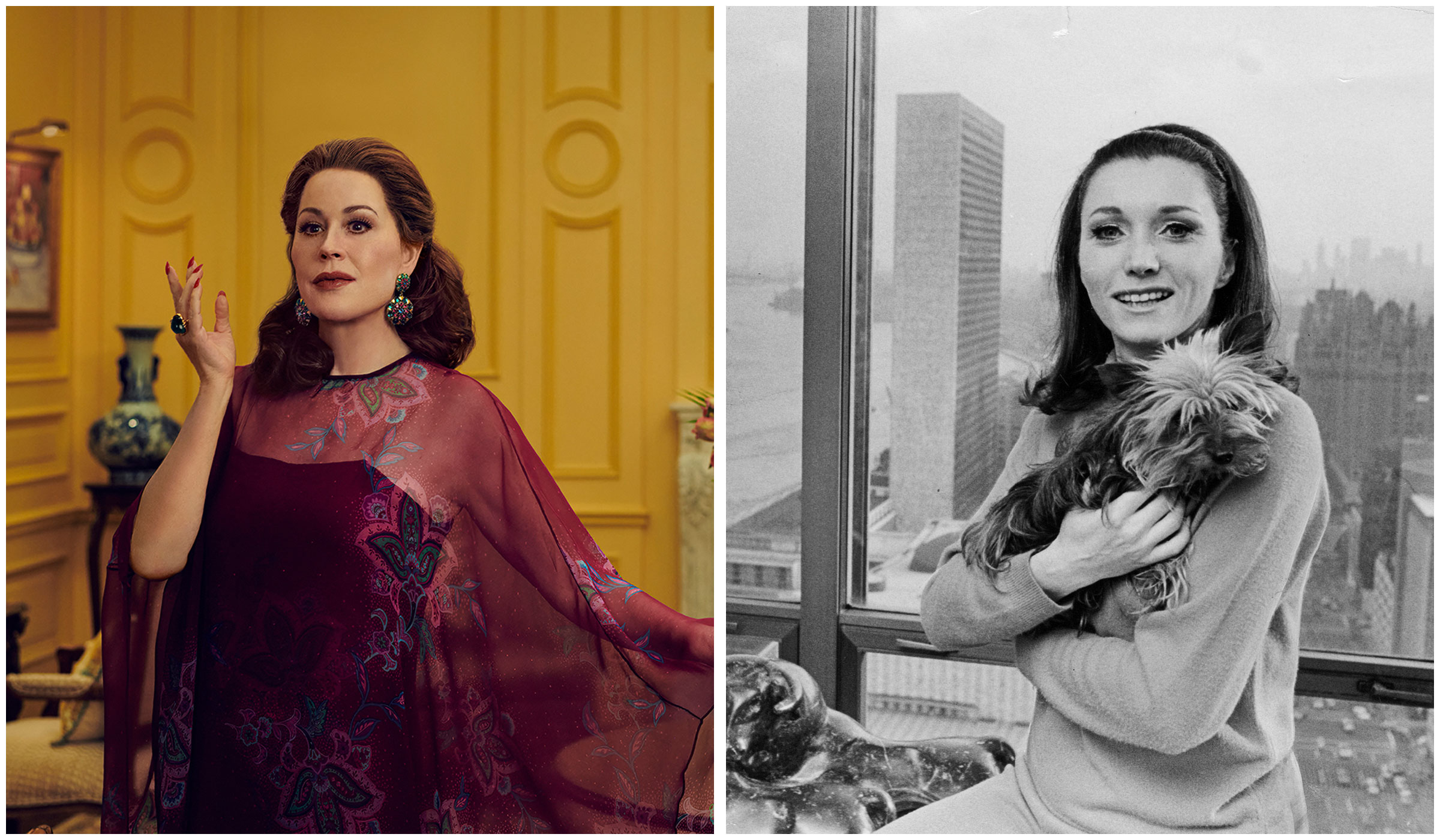
Though Joanne Carson (played in the series by Molly Ringwald) was not one of Capote's cosmopolitan New York swans, she was undeniably one of the most important women in his life, especially in his later years. An LA native, born Joanne Copeland, she was the ex-wife of talk show scion Johnny Carson. Carson was seemingly portrayed in “La Côte Basque 1965” as "Jane Baxter," the wife of a famous late-night talk show host who cheats on her—but unlike the other women in the article, Carson remained a close friend and ally of Capote, until the end of his life.
In the show, Carson's California home and woo woo ways are a refuge for a struggling Capote, who heads west after being disinvited from Thanksgiving at C.Z. Guest's vacation home. In real life, Carson's home was a haven for the final days of Capote's life, offering a respite from the animosity he faced from New York society, something Carson attributed to his decline in later years. "Truman loved celebrity,” she said in a 2006 interview with the LA Times. “He crashed and burned because of the bitchiness of New York.” He treated her Bel Air home like a west coast pied-a-terre, taking over two rooms in her house for a bedroom and a writing room—the latter of which he eventually died in in 1984.
Bill Paley
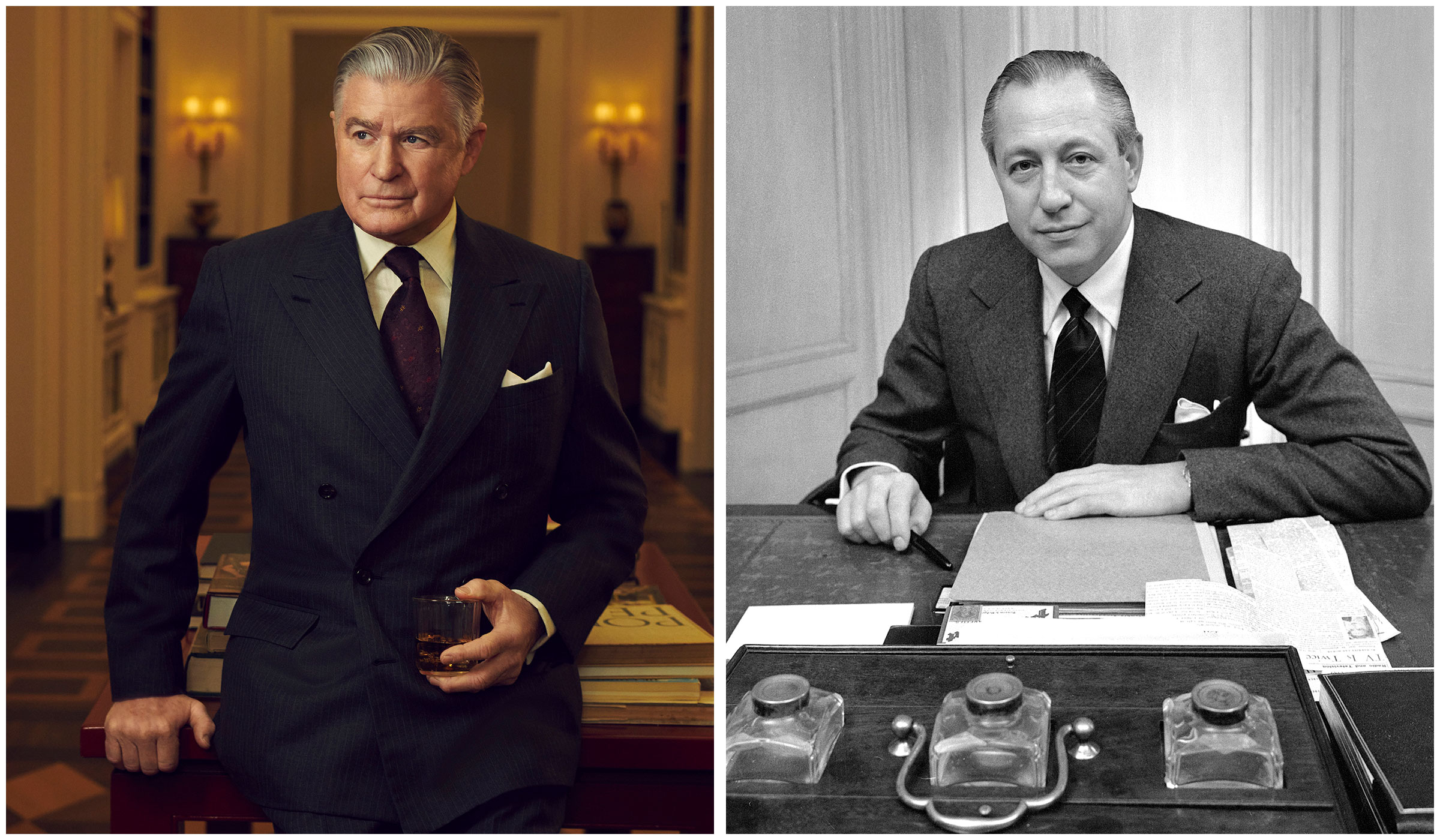
Though William "Bill" S. Paley (played in Feud by the late Treat Williams, who died in a motorcycle crash in 2023 following filming) was one of America's most influential media moguls as the head of CBS, the show hardly touches on his work, focusing instead on his complicated marriage with his glamorous but long suffering wife Babe. In the series, Paley, who was credited with transforming CBS from a small radio conglomerate into a television empire, has numerous affairs, which range from a casual fling with his wife's good friend, Slim Keith to an ego-driven rendezvous with the New York Governor's wife, Happy Rockefeller, the latter of which provided the final bombastic fodder for Capote's revealing “La Côte Basque 1965” article. While Capote had primarily been Babe's confidant, he was also close to Paley—making his veiled depiction of Paley's indiscretions in his article all the more shocking.
In real life, Paley's constant infidelity was an open secret. His womanizing ways have been attributed in some instances to his desire to be accepted by the WASP-populated upper echelons of high society. The son of Ukrainian Jewish immigrants, Paley grew up in Chicago and Philadelphia and graduated from University of Pennsylvania's Wharton School before beginning his communications career with by managing a fleet of struggling radio stations. By the time he married Babe in 1947, Paley was one of the most powerful and wealthy men in media. Babe and Bill's marriage made them the definitive power couple of New York during this time: Babe's social graces and connections gave Paley access to and in many instances, acceptance in worlds he had previously been barred from, while Paley's immense power and influence as an executive kept the couple firmly in the center of the social stratosphere.
Jack Dunphy

Though their romantic relationship is on the rocks in the show, in real life, Capote's deep and at times, complicated, connection with fellow writer, novelist and playwright Jack Dunphy, was one of the most important and longstanding relationships in his life. Dunphy (played by Joe Mantello) met Capote at a party in 1948, after splitting with his then wife—it was a meeting that would lead to a companionship of 35 years. Over the course of their relationship, Capote and Dunphy experienced highs and lows together, but throughout, Dunphy was a constant and stabilizing presence in Capote's life. The pair often vacationed for months at a time in Italy, excursions that gave Capote time and space away from New York's social scene and helped produce some of Capote's greatest work, including In Cold Blood. While they lived together off and on, their relationship turning platonic for a period, throughout it all, it was clear that the pair cared for each other immensely. Capote, who called Dunphy his "family" and named Dunphy his chief beneficiary in his will, once claimed Dunphy was the only man he ever loved. Dunphy, for his part, was equally committed to Capote. Following Capote's death in 1984, he wrote Dear Genius: A Memoir of My Life With Truman Capote, a memoir of their time together and following his own death in 1992, part of Capote's ashes were mixed with Dunphy's and scattered in Crooked Pond, Long Island, where the pair had a property together.
John O'Shea
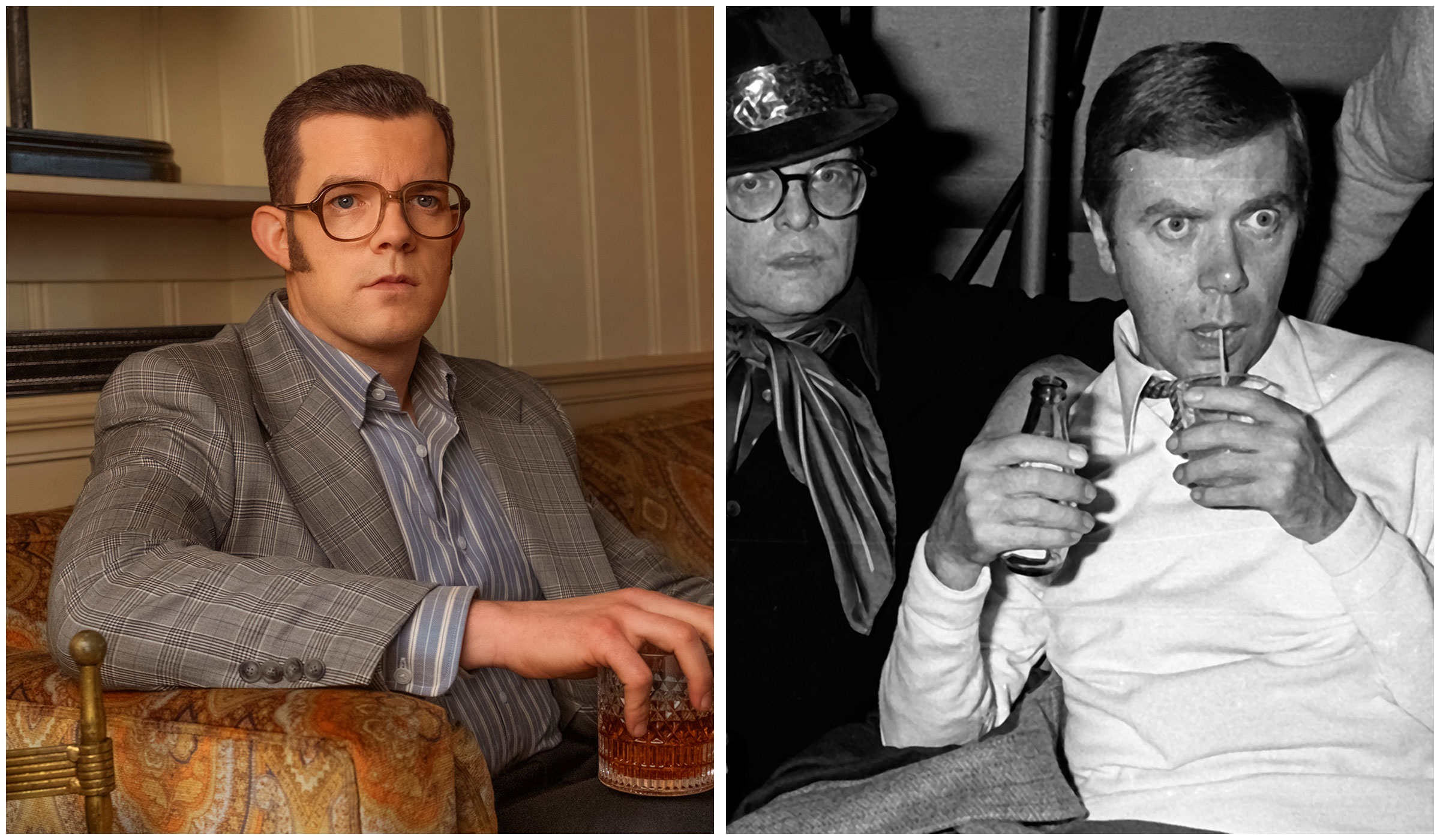
In Feud, John O'Shea (played by Russell Tovey) is an unlikely and menacing lover for Capote, with the show taking liberties with the character by suggesting that O'Shea encouraged Capote's airing out of high society's dirty laundry in "La Côte Basque 1965." However, there are plenty of elements of the character that are true to real life; just as he was depicted in the show, O'Shea was a married Irish Catholic banker with four children from Long Island, whose tumultuous relationship with Capote was notoriously abusive, so much so that in George Plimpton's 1998 oral history biography of Capote, socialite Carol Matthau said that she thought the relationship "hastened Truman's death." Friends of Capote were alarmed by not only by O'Shea's violence and alcohol abuse, but also Capote's trust in him—O'Shea was an aspiring writer who quit his day job to manage Capote's career full-time. Their eventual split, which was littered with temporary breakups and reconciliations, included Capote suing O'Shea in 1976 in Los Angeles Superior Court for allegedly stealing part of the manuscript of Answered Prayers, then dropping the charges in 1981 and Capote hiring people to "rough up" O'Shea, resulting in O'Shea's car being set on fire. Despite their volatile relationship, Capote remained generous in some ways towards O'Shea. When O'Shea left his family and subsequently, Capote, Capote mentored O'Shea's then-13-year-old daughter, Kerry, helping her pursue a modeling career and letting her stay with him in Manhattan.
More Must-Reads From TIME
- The 100 Most Influential People of 2024
- Coco Gauff Is Playing for Herself Now
- Scenes From Pro-Palestinian Encampments Across U.S. Universities
- 6 Compliments That Land Every Time
- If You're Dating Right Now , You're Brave: Column
- The AI That Could Heal a Divided Internet
- Fallout Is a Brilliant Model for the Future of Video Game Adaptations
- Want Weekly Recs on What to Watch, Read, and More? Sign Up for Worth Your Time
Write to Cady Lang at cady.lang@timemagazine.com